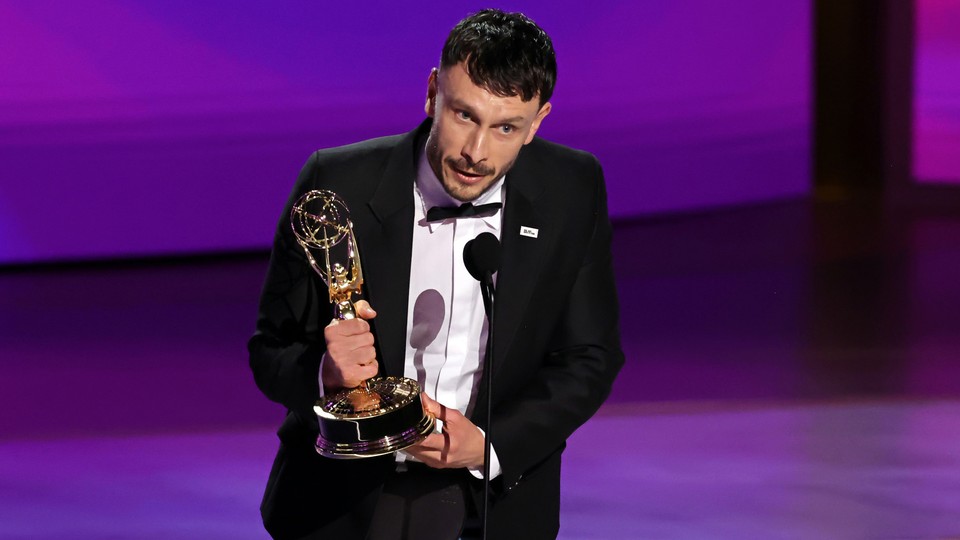The Best Part of the Emmys Was the End
4 min read
As he accepted the Emmy for Outstanding Limited Series last night, Richard Gadd, the creator and star of Netflix’s Baby Reindeer, made a plea to the audience. “If Baby Reindeer has proved anything, it’s that there’s no set formula to this, that you don’t need big stars, proven IP, long-running series… to have a hit,” he said. “The only constant across any success in television is good storytelling, good storytelling that speaks to our times. So take risks, push boundaries, explore the uncomfortable, dare to fail in order to achieve.”
If only the ceremony’s producers had followed such advice. The 76th Primetime Emmy Awards felt more like a mundane telecast than a celebration of the year’s best TV. Part of that familiarity stems from the last Emmys taking place in January after being delayed from 2023 by the Writers Guild and Screen Actors Guild strikes. But even if the previous gala hadn’t happened so recently, last night’s show was still a subdued affair, a filler episode that struggled to deliver something fresh—until the very end.
These latest Emmys essentially copied and pasted creative choices from the January ceremony: The hosts, Schitt’s Creek’s father-and-son duo Eugene and Dan Levy, got mileage out of good-natured jokes about being related, much like the previous host, Anthony Anderson, did with his bit about his punctual mother watching the clock in the audience. There were star-studded cast reunions, and actors from different series popped up in skits that provided a thematic throughline amid the speeches—gatherings of TV dads and moms alike, as well as villains, lawyers, coaches, and cops, all to underline the archetypes that have populated television over the years.
The effect, however, was more tiring than energizing. Highlighting TV’s most common tropes only reduced the medium the Emmys are meant to honor, and though many winners expressed their elation and passion for their work, few said anything actually inspired. The upcoming presidential election generated a handful of calls to vote and little else. The Hollywood strikes, the focus of an intense and dramatic period this time last year, were mentioned only once.
But the ceremony’s final 30 minutes perhaps proved the value of challenging the very tropes it spent three hours celebrating. Baby Reindeer, which won the bulk of the limited-series categories, is a bona fide word-of-mouth hit, a rarity in today’s television landscape. An expanded version of Gadd’s one-man show, the series is full of unknown actors and tackled a delicate subject, that of Gadd’s own experience of being relentlessly stalked by a middle-aged woman.Meanwhile, FX’s Shōgun, the adaptation of James Clavell’s novel set in feudal Japan, won many of the final, biggest awards of the evening in the drama categories. The series proves, too, the value of defying expectations: It’s largely subtitled, demanding its viewers’ attention, and tells a sprawling story of warring lords. And Max’s Hacks, the winner for Outstanding Comedy Series, injected a dose of vitality to round out the night by beating this year’s front-runner—which had just won the top prize in January—FX’s The Bear.
This year’s second round of Emmys didn’t have to be so staid. Even before these invigorating wins, there were moments where the awards seemed ready to break convention—including an amusing segment when Billy Crystal read from his journal of gossipy first impressions of talk-show hosts. The actor John Leguizamo also launched into a spirited speech about the need for inclusion before introducing the Television Academy’s recently elected and first Latino Chair, Cris Abrego. But Abrego’s lengthy, platitude-filled appeal afterward failed to electrify the room, and one of the night’s biggest winners bore a reminder that narrative risk-taking can be dangerous in other ways: The woman on whom the stalker in Baby Reindeer is based has filed a $170 million defamation lawsuit against Netflix. (“We intend to defend this matter vigorously and to stand by Richard Gadd’s right to tell his story,” a Netflix rep said in a statement.)
Award shows must try to be engaging without relying on unexpected winners and impassioned speeches, because neither is ever guaranteed. In January, I praised the Emmys for drawing connections between past series and those currently on-air; the move emphasized how, as much as Hollywood changes, great television requires constant care and thoughtful work. Last night’s edition proved that it also requires invention, not iteration.



